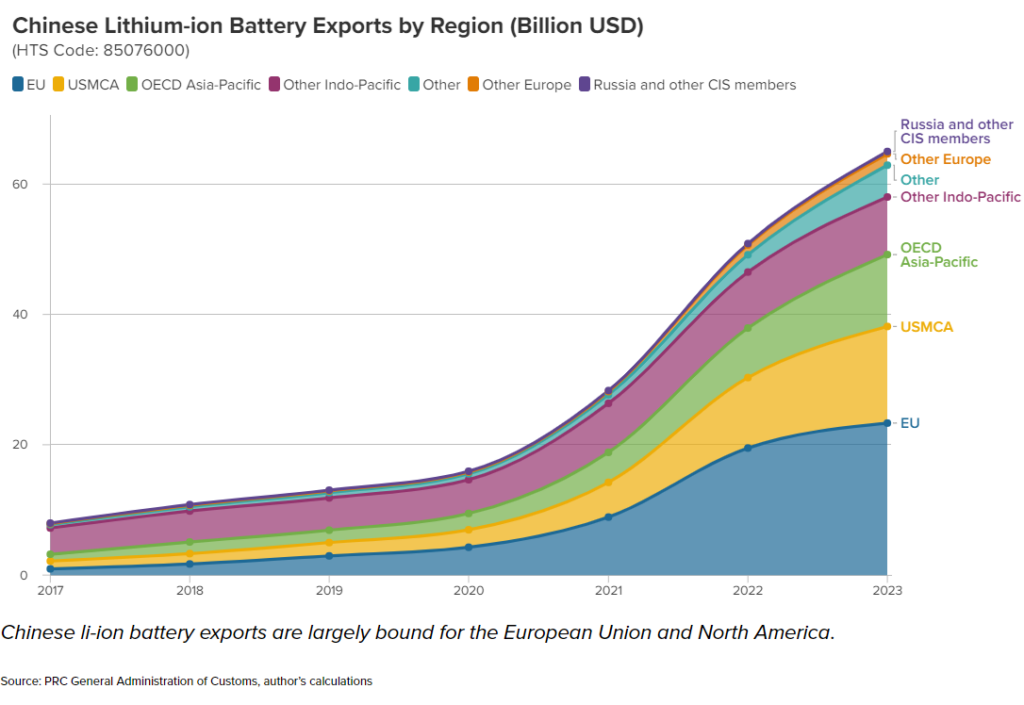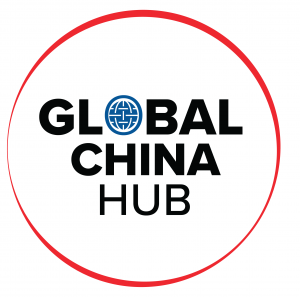Global China Newsletter – A flurry of leader-level diplomacy
Subscribe to the Global China Hub
What a difference a week makes. Russian President Putin’s visit to China this week produced few surprises (besides an awkward hug). The world has grown accustomed to the frequent meetings between Putin and his friend Xi Jinping.
But the significance of Xi’s reaffirmation of a deepening partnership with Moscow at this moment in history must not be overlooked.
The countries’ latest joint declaration proclaims XI’s intent to deepen military coordination and jointly transform the global order with a country which is now a pariah amongst developed democracies due to its invasion and prosecution of a brutal war against a sovereign country – a war effort that China has blatantly sponsored for well over two years.
Xi’s welcome for Putin comes on the heels of his visit last week to Europe designed to shore up ties damaged by that sponsorship. French President Macron and EU Commission President von der Leyen underscored to Xi last week their frustrations with China’s approach, just days after US Secretary of State Blinken stressed similar points in Beijing.
But Xi, true to form, proclaimed China’s neutrality in the war even as a raft of Chinese-produced dual use materials continued to flow to Russia, feeding Putin’s war machine and facilitating Russia’s opening of a new offensive in Ukraine.
This week’s summit meanwhile produced more portrayals of China as a force for peace, recycling China’s vacuous “peace proposal” and positioning as a potential mediator.
How to understand this seeming inconsistency?
Beijing is increasingly confident in its ability to pursue seemingly conflicting global interests without costs.
If China benefits from propping up Russia’s war effort while masquerading as a peacemaker globally, it will do so. If Xi wants to double down on ties with Russia just days after trying to repair the damage caused by that relationship in Europe, he will do so.
It is often said that Putin’s war on Ukraine has put China in a difficult spot diplomatically, pitting China’s preservation of ties with its most important strategic partner against critical economic relations with Europe and China’s desired reputation as a responsible rising power. But Xi believes he is navigating these challenges without suffering real costs. It is up to Washington, Brussels, and other key capitals to change his calculus.
Our editor Tiff Roberts has more on Xi’s trip to Europe, China’s economy, and much more below — Take it away Tiff!
-David O. Shullman, Senior Director, Atlantic Council Global China Hub
China Spotlight
An eight-stop China visit reveals a struggling economy
On an eight-stop visit to China last month that included metropolises (Beijing, Tianjin, Shanghai, and Guangzhou) and hinterland cities (Xi’an, Changsha, Liuzhou, and Nanning), it was obvious to this editor that the economy is still struggling, even long after the pandemic. There are far fewer foreign tourists and international businesspeople on the streets than before, (although Russians were prevalent), small restaurants have been shuttered as consumers spend less, pain from the struggling property sector is visible in numerous empty high rises, while fears that global tariffs will hurt surging Chinese exports abound.
On May 14, the Biden administration announced it was imposing tariffs on $18 billion of Chinese imports including steel and aluminum, solar cells, battery components, and quadrupling tariffs on electric vehicles to around 100%. This followed earlier moves against by the U.S., European Union, Japan, and other nations, to limit Chinese goods. The trade actions are being driven by fears China will unload excess production on the world ravaging producers in other countries around the world. Global Energy Center senior fellow Joseph Webster writes in a new EnergySource article, Chinese lithium-ion battery exports reached $65 billion in 2023, up nearly 400 percent from pre-COVID levels in 2019, with over half being shipped to the EU and United States-Mexico-Canada free trade zone.

The Rhodium Group writes in the China Pathfinder Q1 2024 update, China has seen “overcapacity and a spike in exports” while overseas economies “stepped up actions this quarter to address trade spillover concerns in light of [China’s] weak domestic demand.” As expected, Beijing reacted angrily to the Biden administration’s latest move: “The increase in … tariffs by the United States contradicts President Joe Biden’s commitment to ‘not seek to suppress and contain China’s development’ and ‘not to seek to decouple and break links with China,’” the Commerce Ministry said in a statement (that the US aims to “contain China’s development” was an allegation I heard from numerous Chinese officials, during my April visit.)
Xi seeks a wedging strategy in Europe
As China faces increasing pushback against its trade policies, Xi Jinping embarked on a trip to Europe in early May, his first in five years. The visit to France, Serbia, and Hungary clearly aimed at bolstering support for Beijing abroad, as Atlantic Council experts discussed in a virtual public discussion, A new charm offensive? Unpacking Xi’s visit to Europe.
And in What to look for as Xi Jinping visits France, Serbia, and Hungary, Council experts laid out what to watch for at each of Xi’s stops. While in France, Xi aimed to “reengage the old continent,” writes Léonie Allard, a visiting fellow at the Atlantic Council’s Europe Center, but faced criticism over China’s support for Russia during the Ukraine invasion. Xi’s stops in eastern Europe saw him receiving the red carpet treatment, in part because of his country’s substantial economic presence there. “China has emerged as Serbia’s largest individual provider of foreign direct investment,” writes Stefan Vladisavljev, while “Hungarian Prime Minister Viktor Orbán [has] closely aligned Hungary’s foreign policy with China and Russia in the past decade,” during which time China has been helping construct the Belgrade-Budapest high-speed railway project, writes Zoltán Fehér.
All told, Xi’s Europe trip had three goals, notes Global China Hub assistant director Matt Geraci: “repairing relations in Europe damaged by China’s support for Russia’s war on Ukraine, blunting the EU’s economic security agenda vis-à-vis China, and showcasing Beijing’s strong ties with its stalwart partners Serbia and Hungary.”
The mixed record of China’s “economics-first” in MENA
The Middle East – North Africa (MENA) is emerging as “an important strategic region” for China “with a significant expansion of its interests and presence across the region,” said Jonathan Fulton of the Atlantic Council’s Middle East Programs in prepared testimony to the US-China Economic and Security Review Commission. And unlike most of Europe, it is a region where China is winning the popularity contest with the US. China’s “economics-first approach has contributed to improved public perceptions of China … public polling data from the Arab Barometer consistently shows positive views of China as an external actor, with respondents from 8 out of 9 countries perceiving China more favorably than the US,” Fulton noted.
Beyond economics, Beijing’s goal of playing a larger role in the region, has had only qualified success. While it won acclaim for brokering the Saudi-Iran rapprochement last year and countries in MENA have joined China’s Belt and Road Initiative, it has little success in playing a mediating role in the Israeli-Gaza conflict. “It has little influence on Iran or its non-state partners of Hamas, the Houthis, or Hezbollah, and is not seen as credible by Israel,” while instead China has ended up looking like a “very transactional and self-interested [actor] in the region, rather than a responsible extra- regional power with substantial Middle East interests,” writes Fulton.
See also – Jonathan Fulton’s new China-MENA Newsletter that just launched on Substack.
China’s rival Taiwan, interestingly, has staked out a very different position with its strong support for Israel. “Taiwan sees a reflection of itself in Israel—two vibrant democracies facing threats from hostile neighbors. Both nations wield substantial economic and technological prowess, and both heavily depend on US military exports and diplomacy,” writes the Global China Hub’s Tuvia Gering.
ICYMI
- GCH Nonresident Fellow Hanna Dohmen wrote a strategic insights memo outlining a framework for policies aimed at safeguarding and advancing US leadership in emerging technologies amid competition with China.
- The Digital Forensics Research Lab authored a new report on how Chinese state media experimented on how to better reach Taiwanese audiences online around the January 2024 election.
- A new China-MENA Podcast episode, hosted by Jonathan Fulton and featuring the Observer Research Foundation’s Ambassador Navdeep Suri and Kabir Taneja, explores the degree to which the India, Middle East, Europe Economic Corridor (IMEC) can rival China’s Belt and Road Initiative (BRI).
- The Hub’s Kaush Arha, the GeoEconomics Center’s Clete Willems, and the Carnegie Endowment for International Peace’s Peter Harrell released a New Atlanticist article to craft an eight-point bipartisan economic strategy that builds off of the Select Committee on the CCP’s report on resetting the economic relationship with China.

Global China Hub
The Global China Hub researches and devises allied solutions to the global challenges posed by China’s rise, leveraging and amplifying the Atlantic Council’s work on China across its 16 programs and centers.

Follow us on Twitter @ACGlobalChina